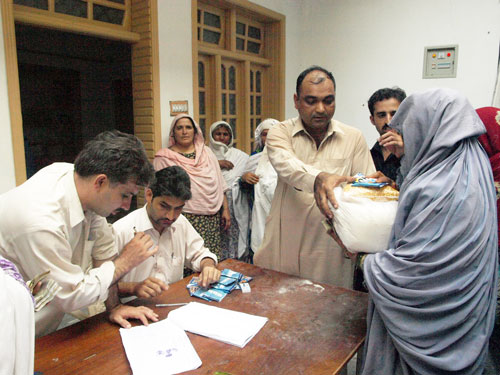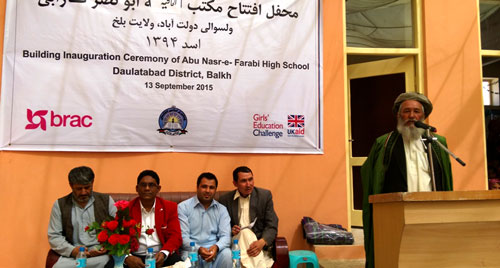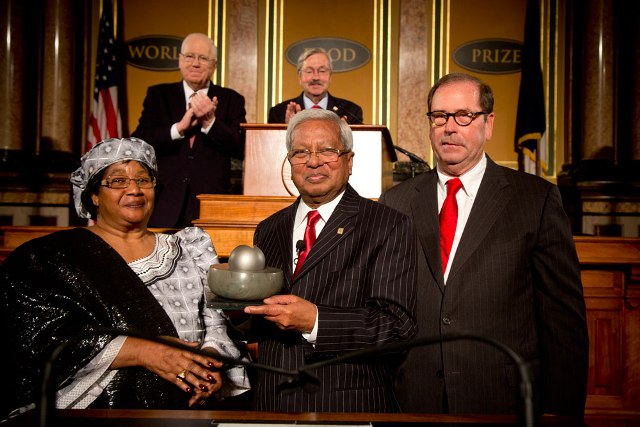
English (963)
Children categories
Sir Abed receives honorary degree from University of Bath
07 July 2010, Dhaka. Sir Fazle Hasan Abed, founder and chairperson of BRAC, received an honorary Doctor of Laws degree today from the University of Bath for his outstanding contributions to social improvement.
The ceremony at Bath Abbey was presided over by university chancellor Lord Tugendhat and was preceded by a public procession of senior campus officers and academics.
Sir Fazle also received several honorary degrees including Doctor of Humane Letters from Yale University in 2007, Doctor of Laws from Columbia University in 2008 and Doctor of Letters from the University of Oxford in 2009.
Developing a BRAC wide Child Rights Policy
11 May 2010, Dhaka. BRAC is on the process of developing a BRAC wide Child Rights Policy. Taking forward the process of developing this policy, a day long workshop was conducted today at BRAC Centre. The workshop was facilitated by Ms. Kate Eversteyn, Child Protection Officer, AusAID. The objectives of the workshop were to help BRAC:
(a) Define Child Abuse
(b) Examine Child protection policy and standards
(c) Identify the risks to children in various programmes
(d) Manage complaints of child abuse and
(e) Develop child protection policies and procedures.
BRAC Chairperson provides future directions for BRAC in Afghanistan

22 June 2010, Dhaka. BRAC Founder and Chairperson Sir Fazle Hasan Abed visited Afghanistan for a short trip (June 18th – June 21st) to get an up close view of BRAC’s progress there.
Sir Fazle was accompanied by other high officials of BRAC in the trip namely Muhammad A. (Rumee) Ali- Managing Director, BRAC Enterprise and Investments, Md. Aminul Alam- Executive Director, BRAC International Programmes and Md. Salauddin Imam-Director, BRAC Bank incorporate Afghanistan.
The Chairperson met with senior BRAC Afghanistan Staff and got briefed about the current activities of BRAC in Afghanistan. The Chairperson talked to each Programme Managers individually about the relevant programme activities and provided valuable suggestions for the improvement and future directions of the programmes.
Sir Fazle emphasised on reducing maternal mortality and on increasing the coverage of immunization in Afghanistan. He also spoke about establishing resident schools for girls and introducing the Targeting Ultra Poor Programme in Afghanistan. Sir Fazle further added that a BRAC Afghanistan Governing Body needs to be formed which would consist of highly distinguished professionals and elite social personalities who will bring their diverse skills and experience to the governance of BRAC Afghanistan.
The Chairperson also attended the Board meeting of BRAC Bank-Afghanistan.
Two receptions were also arranged in honour of the Chairperson being knighted. Among the guests Ministers and Deputy Ministers of the Afghan Government, embassy officials, civil society personalities, bank officials, Afghanistan Chamber & Commerce and donors attended the receptions.
BRAC Bank among the 2010 FT Sustainable Banking Awards Winners
13 July 2010, Dhaka. Last week, BRAC Bank in Bangladesh was awarded the Emerging Markets Sustainable Bank of the Year Award for the Asian region.
Now in their fifth year, the awards recognize banks and other financial institutions that have shown leadership and innovation in integrating social, environmental and corporate governance considerations into their operations.
"Broadening financial services to the poor and helping to raise living standards around the world is good for business and good for the global economy," said Lars Thunell, IFC Executive Vice President and CEO.
Click here to read more about the award and the gala dinner.
Construction of a BRAC agriculture training centre in Uganda
08 July 2010, Dhaka. An agriculture training centre is being constructed in Uganda. The centre will be used to carry out agriculture research and experimentation at BRAC’s Nakaseke farm. The centre will include residential facilities. The training centre is expected to be completed within 6 months.
BRAC and UNICEF aim for closer ties
08 July 2010, Dhaka. BRAC and UNICEF have collaborated on different projects over the years. To strengthen this tie further and work towards Bangladesh’s national goals both the organisations have decided to collaborate more frequently to address the impending issues of Bangladesh. The main focuses are education, child protection, health and nutrition, and water and environmental sanitation.
BRAC reaches 50,000 people with food aid and assistance in Khyber Pakhtunkhwa

11 August 2010, Islamabad. The number of people affected by the worst floods in Pakistan that the country has witnessed in decades continues to rise as the scale of the disaster becomes more serious with every passing day.
A rapid assessment of the situation by UN- OCHA in Pakistan has found that nearly one million people have been displaced by flooding in Nowshera, Charsadda, Mardan and Peshawar, four districts in the hard-hit province of Khyber Pakhtunkhwa (KPK), 100,000 homes have been destroyed in these districts, while some 50,000 others have sustained damage. Nowshera alone is home to over 650,000 affected people, while in some parts of Charsadda, the waters have destroyed all crops. The meteorological department of Pakistan has released fresh flood warnings on Wednesday, putting parts of Punjab and Sindh on alert and calling on foreign donors to step up to contain the country`s worst humanitarian disaster.
There is a serious shortage of clean water, food, blankets, sleeping mats and health facilities for the affected people. BRAC Pakistan is actively engaged in emergency relief efforts for the flood victims in the region of Khyber Pakhtunkhwa (KPK). Eleven BRAC branches have distributed 6kg food parcels and oral saline sachets to more than 8,000 affected families–benefiting almost 50,000 flood victims. An additional 1650 households received six litres of bottled water, a plastic floor mat for sleeping on, and 1000 rupees for house repairs.
BRAC is providing emergency health care from four health camps that have been set up. So far, we have treated 5,606 people and distributed 425 free mosquito nets. BRAC WASH teams have also installed 22 water sinks and hand pumps benefiting entire communities.
BRAC Pakistan is constrained by a lack of funds for emergency relief supplies and is appealing for international funds in order to scale up its work to other affected districts where it has staff and branches.
For further information about BRAC or on how you can contribute to flood relief efforts, please write to This email address is being protected from spambots. You need JavaScript enabled to view it.
UK Minister Alan Duncan praises BRAC programmes

At a BRAC pre-primary school in Gilondo village, the minister took part in various learning games with the children and was particularly impressed by the school’s interactive teaching methods.
Whilst visiting the home of Modhumala, a BRAC microfinance client in Uchutia village, he observed a weekly microfinance group meeting on her courtyard and spoke to several members of BRAC’s ultra poor programme. He was especially moved by the significant improvements Modhumala was able to bring to her life through various enterprises she started with microloans, citing this as a perfect example of the benefit of giving a helping hand instead of a hand out.
“...going around with BRAC was very instructive and very useful, they’re doing some great things. A few minutes ago, I was with some of the ultra poor where the programme is to give them a grant of a cow or chicken to begin a life which has some kind of livelihood behind it. It’s from these little beginnings that development has to start, and that’s what I’m seeing in practice today.”
Later on, he joined a community health forum and participated in an eye examination for reading glasses conducted by a BRAC health volunteer. His final stopover was at an ante-natal clinic for expecting mothers where he observed various health examinations designed to identify pregnancy-related complications.
The Minister was accompanied by Acting British High Commissioner Duncan Norman, Head of Department for International Development (DFID), Bangladesh, Chris Austin, BRAC Executive Director Mahabub Hussain as well as other senior officials from BRAC and DFID Bangladesh.
School inauguration in Balkh province

On 13 September 2015, BRAC Afghanistan inaugurated a school building in Daulatabad district of Balkh province. The inauguration ceremony which took place in the new building premise was attended by representatives from the Ministry of Education, country representative of BRAC Afghanistan, Shura leaders, teachers, female students from the community and their parents.
A Shura leader mentioned that there is only one high school in this village. The officials from the Ministry of Education urged the community people to inspire their children to seek education.
The new building built on a land donated by the community consists of five classrooms, one office room, two latrines and one hand pump. The classrooms are well equipped with necessary academic materials and teaching supplies. Currently 90 female students attend the school.
Sir Fazle Hasan Abed has been honoured as the 2015 World Food Prize Laureate

Founder of BRAC received this prestigious prize for giving nearly 150 million people worldwide the opportunity for enhanced food security and a pathway out of poverty.
BRAC founder and chairperson Sir Fazle Hasan Abed has been honoured as the 2015 World Food Prize Laureate, on 16 October 2015 at 06:30am (Bangladesh time) at a ceremony held at the Iowa State Capitol Building in Des Moines, Iowa, USA. This highly prestigious prize was conferred to him for his outstanding contribution to enhancing the world's production and distribution of food to those most in need.
The chairman of The World Food Prize John Ruan III handed over the award to Sir Fazle at the event which was the centrepiece of a three-day international symposium. This prize which often referred as the Nobel Prize for food and agriculture also includes USD 250,000.
Receiving the award Sir Fazle said, “I must acknowledge that the award does not belong to me alone, it is the recognition of BRAC’s work over the last 43 years in providing pathways out of poverty for millions of people in Bangladesh and other countries in Africa and Asia.”
He also said “The real heroes in our story are the poor themselves and, in particular, women struggling with poverty who overcome enormous challenges each day of their lives. Throughout our work across the world, we have learnt that countries and culture vary; but realities, struggles, aspirations and dreams of poor and marginalised people are remarkably similar. In order to solve the multidimensional problems of poverty, we have to think big, in terms of millions not thousands and holistically. In the coming decades we must refine methods of delivery at scale, placing solutions at the hands of poor people themselves and track progress. Only by putting the poor specially women in charge of their own lives and destinies will poverty and deprivation can be removed from the face of the earth.”
Guests and dignitaries present at the ceremony included US secretary of agriculture Tom Vilsack, president of World Food Prize Foundation Ambassador Kenneth Quinn, president of Iowa senate Honourable Pam Jochum, speaker of Iowa house Honourable Linda Upmeyer. Former president of republic of Malawi and founder of the Joyce Banda Foundation Mrs Joyce Banda was present as distinguished special guest of honour. The ceremony was presided by the governor of Iowa Terry Branstad.
BRAC is widely credited as a major contributor to Bangladesh's achievement in halving poverty and hunger levels since 1990, in line with the UN's Millennium Development Goals, through its sustained efforts in the fields of poverty and hunger eradication and food security. By focusing on scalable solutions, BRAC’s food programmes have turned into sustainable social enterprises that provide inputs and access to stable markets for the rural poor. From its inception till today,
BRAC has helped nearly 150 million people worldwide with the opportunity for enhanced food security.
Earlier this year, Ambassador Kenneth M. Quinn, announced Sir Fazle as this year’s winner at a ceremony at the State Department in Washington, DC.
BRAC's agriculture and food security programmes are part of a larger set of poverty eradication interventions working in 11 countries, empowering the poor, especially women and girls, using tools such as microfinance, education, health care, legal services, community empowerment, social enterprises, and a full-fledged university, BRAC University, in Dhaka.
Watch Sir Fazle's speech at the ceremony
Join the world’s biggest family




